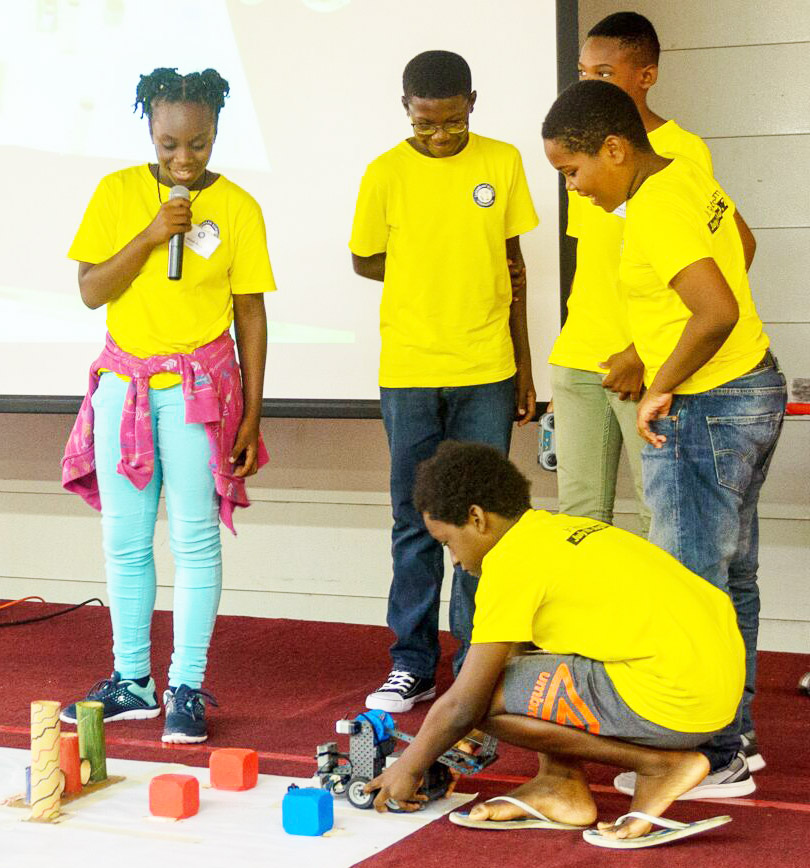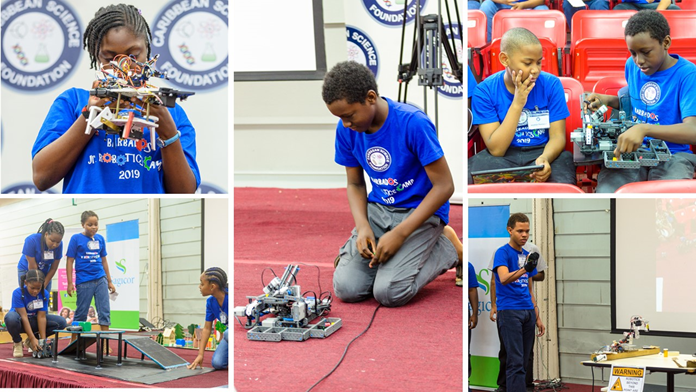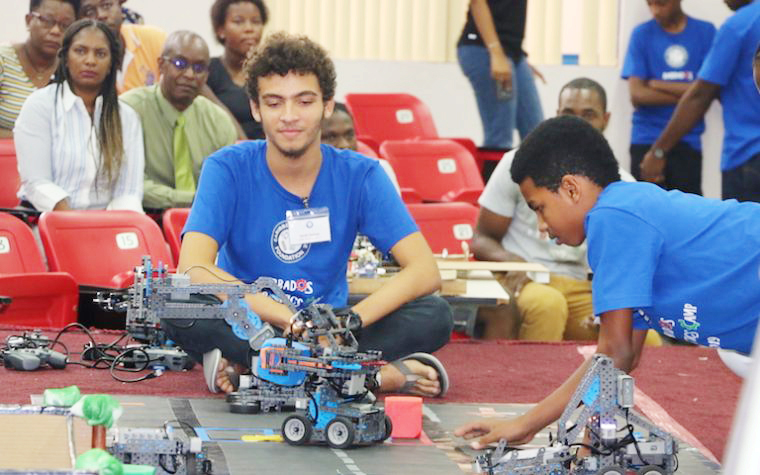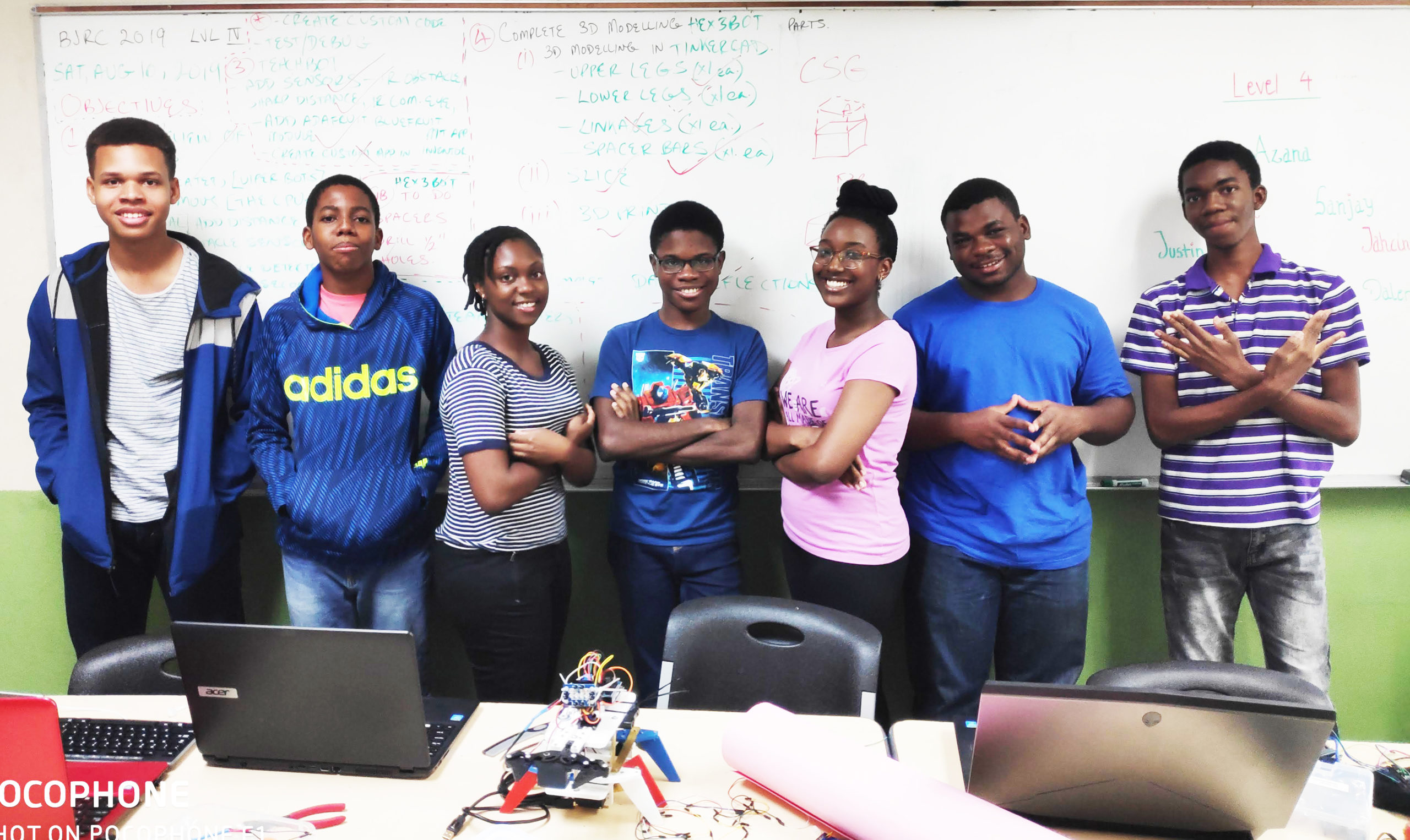2025 Barbados Junior Robotics Camp
The Barbados Junior Robotics Camp (BJRC) is an annual summer enrichment program for young Barbadian students interested in robotics. The BJRC is offered at 4 different levels for students in the 10 to 18 age range. The BJRC is conducted by the CSF in partnership with the UWI Barbados Cave Hill Campus. Please read the overview of the BJRC at https://caribbeanscience.org/barbados-junior-robotics-camp/ for more details.
All four camp levels will run in parallel. For students, the Camp will begin on Tuesday 15 July 2025 and conclude on Friday 15 August 2025 with lab clean up followed by the Awards and Certificate Presentation Ceremony. The month-long camps will run Monday-Friday 8:30 am to 3:00 pm, except for holidays on the Campus of the UWI, Barbados. The highlight will be the Students’ Public Showcase of their robots in action on the afternoon of Thursday 14 August 2025.
The curricula for the 4 camps are described below. Through these curricula, the students employ basic principles from physics, learn engineering design principles, enhance their computer programming skills, and explore examples of how science and math are applied to robotics and engineering. All campers are expected to follow along with the camp content outside camp hours for the duration of the camp. This includes homework and personal study/research requiring approximately 2 hours per night (weekends included). 
One major highlight of the BJRC is the Final Projects Presentation where campers showcase their various robotics projects to the public. To ensure a successful event, campers must work diligently on their robots and presentations for the showcase throughout the five weeks of the camp. It can be a challenge to finish projects on time, as troubleshooting, fixing problems and final tweaks always take longer than expected. It is therefore essential that all campers be fully focused during the camp and be present for all camp hours. If the camper is involved in other activities that would overlap with the camp and may cause the camper to be late or miss camp days, he/she should not participate in the camp.
The Levels I & II Camps – The Beginners
Level I students are at least 10 years of age by July 1, 2025 and have little or no previous STEM, programming, or robotics experience. We expect to have multiple Level I sections where students are assigned based on age level.
New Level II students are at least 12 years of age by July 1, 2025 and have some experience in STEM, programming, or robotics. We expect to have multiple Level II sections where students are assigned based on age level and experience in STEM, programming, and robotics. Returning Level I students or students with considerable Level I experience may be admitted to Level II based on the recommendation of the coaches. Special cases are at the discretion of the coaches.
The aim of the Levels I & II camps is to introduce STEM (Science, Technology, Engineering and Mathematics) concepts to children in the above-mentioned age range. While no previous experience in robotics is required, the camp is targeted at children who are passionately interested in science and technology. Students at the upper end of the Level I age range who progress rapidly may be promoted to the Level II Camp after two weeks in Level I.
The Level III Camp – The Creators
New Level III students are at least 13 years of age by July 1, 2025 and can demonstrate substantial previous STEM, programming, or robotics experience. We expect to have multiple Level III sections where students are assigned based on age level and experience in STEM, programming, and robotics. Returning Level II students or students with considerable Level II experience may be admitted to Level III based on the recommendation of the coaches. Level III applicants must: (1) demonstrate that they have the STEM, programming or robotics experience to handle the challenges that will be encountered, and (2) have a favorable review from their former coaches, and/or teachers/Principal. Special cases are at the discretion of the coaches.
The Level III syllabus comprises a mix of classroom teaching, and hands-on building, programming and the use of micro-controllers. Level III focuses on both “teleoperated” and fully “autonomous” robots that require a substantial amount of computer programming. For example some Level III robots could involve the use of AppInventor, and Arduino-kit robots. Campers will learn to document their program-algorithms using standard practices, and work with maps for navigation. The goal is to design and/or build robots that can robustly operate without human intervention (primarily through the use of “feedback-driven” action sequences created using “text-based” programming tools and complex sensors).
The Level IV Camp – The Innovators
Level IV is open to persons who are at least 15 and less than 19 years old on July 1 2025, can demonstrate substantial STEM, programming or robotics experience as well as some microcontroller experience. The lower age requirement is imposed because Level IV requires the use of power tools, and safety is our major concern (no exceptions). Level IV Campers are expected to work in a safety-conscious manner when using hand and power tools, and to document both builds and algorithms using standard practices. Returning Level III students or students with considerable Level III experience may be admitted to Level IV based on the recommendation of the coaches.
The goal of the Level IV Camp is to design and build fully “autonomous” robots that can address a contemporary problem, primarily through the use of “feedback-driven” action sequences created using programming tools along with simple sensors. Level IV is not kit-based. The Level IV students are given a set of random parts, and they use 3-D printers to create custom parts as needed for their design. Level IV robots must employ micro-controllers and a high-level programming language. More specifically, Level IV designs must employ Arduinos and/or Raspberry Pi’s. Preferred programming languages are Python and C++. The use of AI and machine-learning algorithms is encouraged.
Level IV applicants must: (1) demonstrate that they have the STEM, programming or robotics experience to handle the challenges that will be encountered and (2) have a favorable review from their former coaches, and/or teachers.
Through these curricula, the students in all 4 levels employ basic principles from physics, learn engineering design principles, enhance their computer programming skills, and explore examples of how science and math are applied to robotics and engineering. Teamwork is an essential skill that is emphasized in all the camps, and its value is highlighted.
2025 Camp Application Requirements
1. Recommendation Form for New BJRC Campers
If it’s a child’s first time applying to the BJRC, the BJRC recommendation form from either a science or math teacher, or a principal, or a robotics coach of the child is required as one component of the application to the Camp. This online recommendation form is available HERE for submission to the CSF before 11:59 pm EST on 01 July 2025. From the CSF’s perspective, the camper is ultimately responsible for making sure the teacher, coach or Principal fills out this form before the application deadline.
2. Survey Form for Previous BJRC Campers
Please note that all current applicants who previously participated in a CSF Robotics Camp are required to fill out and submit the online survey for the last camp in which they participated, in order for their applications to be considered. This means that previous Level I – III campers from the 2015 – 2024 BJRC who wish to participate in the next level up in the 2025 BJRC must fill out the survey for their last camp experience, if they have not already done so. The form can be accessed at
4. Camp Application Form for Students
Before filling out any of the Camp application forms, please be sure to read the BJRC Camp Overview, as it should answer most of your questions.
Key documents you will need to complete the application form below are:
- Proof of either Barbados or Caribbean citizenship, or other citizenship
- A photograph of the camper- (head and shoulders only in .jpg or .png format) for the camper profile booklet
The 2025 student application form for all 4 levels can be accessed at the link below
ONLINE 2025 STUDENT APPLICATION FORM
The application deadline is 30 June 2025.
Camp Fees
The CSF, through donations from its sponsors, bears almost all of the financial costs associated with the BJRC. However, parents/guardians are expected to contribute a camp participation fee of BD$ 500 per child for the entire month. For parents who are unable to pay the fee in full before the camp starts, the CSF can accommodate up to 4 weekly payments upon request, and some assistance with the camp fees may be possible. A minimum deposit of $20 is required from all families (including those requesting financial aid) by the first day in order to enroll each student in the Camp. All campers receive a CSF robotics T-Shirt which must be worn at the Final Projects Showcase at the end of the Camp.
The CSF does not want the inability to pay the camp fee to exclude children from the Camp. For families that can demonstrate extreme financial challenges (even unable to pay in weekly instalments) the CSF has set aside a limited amount of scholarship funds to assist the most needy with the camp fee. Such families can request assistance by filling out the form below
BJRC REQUEST FOR FINANCIAL AID FORM
Filling out the form does not guarantee that financial aid will be granted. The CSF reserves the right to fact check the claims made in the financial aid form.
On the other hand, we would like to encourage families who are willing to pay more than the $500.00 camp fee to do so, as it would allow the CSF to assist more of the economically disadvantaged students.
Camp Selection Criteria
The BJRC Admissions Committee is responsible for selecting the students. The Committee comprises a subset of the Robotics Camp Planning Committee and the Head Coaches. Because of budget and/or space limitations, the Committee may have to limit the number of participants in the Camps.
The Admissions Committee will only consider complete applications that arrive before the application deadline, and the age limit for each camp and the citizenship (or the 2-year consecutive Barbados school attendance) requirement will be strictly enforced. Applicants that fail to convince the Committee that the potential camper is well behaved and interested in robotics, or in the case of Levels III and IV has the adequate background and experience to handle the work, will not be admitted to the appropriate camp. It is important to note that participation in a previous BJRC camp does not guarantee a spot in the upcoming Camp.
For all camp levels, the Admissions Committee will rank applicants taking the following factors into consideration, as appropriate:
- The strength of the recommendation from the teacher or Principal which is expected to include a statement about the behavior of the student, and about their interest in STEM, programming and/or previous robotics experience
- The behavior of the camper in any previous CSF camps or workshops, if applicable. Campers who have been disruptive or disinterested will be given the lowest priority
- An assessment of the applicant’s interest or technical background in STEM, programming and robotics based on the submitted materials, and the coaches’ evaluations if the applicant was a previous camper
- To achieve the CSF’s goal of an equal representation of boys and girls in the Camps, admissions preference will be given to the gender that is underrepresented
- The age of the applicant (older applicants will be given preference over younger applicants who have to option to re-apply in later years)
- In the event where two or more applicants are equally ranked, and the number of such applicants exceeds the unfilled spots, a lottery system will be put in place to select the remaining successful candidates
Eligibility Criteria for Children who are Non-Barbadian Citizens
Children who are not citizens of Barbados may be considered for admission to the Camp if space is available in the appropriate Camp level, and they meet one of the following conditions:
- The child holds citizenship (other than Barbadian) in a CARICOM or CARICOM-Associate Country and the parents can take care of housing, meals, travel and all other living expenses for the child while the child is in Barbados for the 5 weeks of the Camp. (submit proof of citizenship with application).
- The child does not hold Caribbean Citizenship, but at least one parent has been legally stationed in Barbados for employment purposes for one or more consecutive years (submit proof with application). This category has the lowest priority for admission, and if such students are admitted, the non-CARICOM-citizen fee of US$ 1,000 must be paid at the time of registration.
Application Form for Coach Positions
The CSF is seeking qualified coaches who have the experience and can commit one month in the summer to help us run the four Levels of the camp. In some cases, half-time positions are feasible.. To apply for a coach position, please fill out the coach application form here.
These positions carry a modest stipend. A signed contract with the CSF must be executed prior to employment. While BJRC coach applications are accepted at all times during the year, BJRC coach applications should ideally be submitted by 15 April of each each year as coach training begins well in advance of the camp dates.
Level III Camp Input Standard
Students entering the Level III Camp must have experience with:
-
- Basic/advanced icon-based programming (e.g., Scratch/Blockly)
- create, save, run and debug an icon-based programme
- basic constructs (variables, types, conditional statements, loops, sign/direction)
- modular/procedural routines in projects
- implementation of Artificial Intelligence
- A Robot Programming Environment (e.g., ModKit/Blockly/EV3)
- create, save, run and debug a robot program
- load software onto Robot using a serial/USB link
- run a standalone program on the robot
- run multiple and multi-goal standalone program(s) on the robot
- A Robot Kit (e.g., VEX IQ)
- use robot parts from programming environment
- binary output (e.g., buzzer/LED),
- analogue output (e.g., drive, servo, motor),
- binary sensor (e.g., touch sensor),
- analogue sensor (e.g., light sensor)
- follow build instructions to produce a frame
- identify construction parts
- manipulate connect and disconnect parts
- read and interpret construction drawings
- create construction drawings using provided parts using CAD tools
- test and compare different robot designs (simulated/built)
- use robot parts from programming environment
- A Robot competition
- navigate a maze autonomously or using teleoperation
- achieve a block-collection task autonomously or using teleoperation
- achieve a line-following task and/or ball-manipulation task autonomously
- achieve a multi-goal task autonomously
- Specific STEM concepts
- science: motion, physics of electricity
- technology: batteries, communication protocols + information coding/transmission algorithms, multimeters, network algorithms
- engineering: gripper and fasteners and proportional control
- maths: binary numbers, average, units, basic geometry and shapes, vectors
- Experience/familiarity with the use of measurement tools
- Protractor, ruler, scale
Graduates of a previous CSF Level II Camp are expected to have met all these criteria.
Level IV Camp Input Standard
Students entering the Level IV Camp should have experience with:
-
- Basic/advanced icon-based programming (e.g., Scratch/Blockly)
- create, save, run and debug an icon-based programme
- basic constructs (variables, types, conditional statements, loops, sign/direction)
- modular/procedural routines in projects
- implementation of Artificial Intelligence
- A Robot Programming Environment (e.g., ModKit/Blockly/EV3)
- create, save, run and debug a robot program
- load software onto Robot using a serial/USB link
- run a standalone program on the robot
- run multiple and multi-goal standalone program(s) on the robot
- A Robot Kit (e.g., VEX IQ)
- use robot parts from programming environment
- binary output (e.g., buzzer/LED),
- analogue output (e.g., drive, servo, motor),
- binary sensor (e.g., touch sensor),
- analogue sensor (e.g., light sensor)
- follow build instructions to produce a frame
- identify construction parts
- manipulate connect and disconnect parts
- read and interpret construction drawings
- create construction drawings using provided parts using CAD tools
- test and compare different robot designs (simulated/built)
- use robot parts from programming environment
- A Robot competition
- navigate a maze autonomously or using teleoperation
- achieve a block-collection task autonomously or using teleoperation
- achieve a line-following task and/or ball-manipulation task autonomously
- achieve a multi-goal task autonomously
- Specific STEM concepts
- science: motion, physics of electricity
- technology: batteries, communication protocols + information coding/transmission algorithms, multimeters, network algorithms
- engineering: gripper and fasteners and proportional control
- maths: binary numbers, average, units, basic geometry and shapes, vectors
- Experience/familiarity with the use of one or more of the following machine-shop/workshop tool(s)
- Drilling tools: Electric drill, rotary tools
- Heat tools: Heat-gun, soldering irons
- Sanding tools: Sander, sandpaper
- Cutting tools: Saw, hacksaw, utility knife, wire cutters/strippers
- Fastening Tools: Screwdriver, spanner, hex-keys, bench clamps
- Bending Tools: Metal crimping, folding
Graduates of previous CSF Level II and Level III Camps are expected to have met all these criteria.
- Basic/advanced icon-based programming (e.g., Scratch/Blockly)
- Basic/advanced icon-based programming (e.g., Scratch/Blockly)




